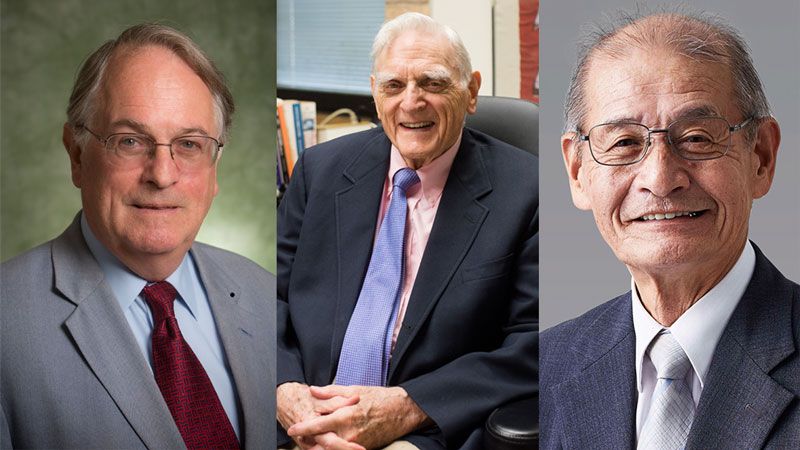
tanley Whittingham (left), John Goodenough and Akira Yoshino (right) did work in the 1970s and 1980s that led to the development of lithium-ion batteries.Credit: Binghamton University/UT Austin/The Japan Prize
The Nobel Prize in Chemistry has been awarded to John Goodenough, Stanley Whittingham and Akira Yoshino for the development of lithium-ion batteries — a technology that ushered in a revolution in energy storage.
All three contributed to the evolution of the kind of lightweight, rechargeable batteries that power today’s mobile phones and other portable electronic devices — and make “possible a fossil fuel-free society”, the Nobel chemistry committee said.
John B. Goodenough: How we made the Li-ion rechargeable battery
Goodenough, a solid-state physicist at the University of Texas at Austin who is 97, becomes the oldest ever Nobel laureate — although the committee said that it had not been able to reach him at the time of the prize announcement. The three researchers will get equal shares in the prize, worth 9 million Swedish kronor (US$910,000).
“Amazing! Surprising!” Yoshino, a chemist at Meijo University in Nagoya, Japan, told journalists after the announcement.
“I am very grateful that I had that honour, it’s splendid,” Goodenough, who was in London to receive a separate prize, told Nature later in the day. “But I am the same person I was before.”
“In my view, this award is long overdue,” says Saiful Islam, a materials chemist at the University of Bath, UK. “It‘s great to see that this important area of materials chemistry has been recognized. As we know, these batteries have helped power the portable revolution. Most people probably saw this Nobel prize news on a device powered by a lithium-ion battery,” he says.
Rechargeable world
In a lithium-ion battery, lithium ions move from the negative electrode (anode) to the positive electrode (cathode) through an electrolyte while the battery discharges, then back again when it recharges.
While working for the oil company Exxon in the 1970s, Whittingham, who is now at the State University of New York at Binghamton, proposed the idea of rechargeable lithium batteries and developed a prototype that used a lithium-metal anode and a titanium disulfide cathode. The battery had a high energy density and the diffusion of lithium ions into the cathode was reversible, making the battery rechargeable. But high manufacturing costs and safety concerns meant the technology could not be commercialized.
In the late 1970s and early 1980s, Goodenough developed rechargeable batteries with cathodes made from layered oxides capable of storing lithium ions. This greatly improved the energy density, and lithium cobalt oxide remains the cathode material of choice for lithium-ion batteries.
And in the 1980s, Yoshino made changes to the materials that dramatically improved safety and enabled commercial production of the batteries. His design pioneered the use of carbon-rich anode materials into which lithium ions could be inserted. “I started in 1981, and I invented the lithium-ion battery in 1985,” Yoshino said by phone.
Sustainable future
Laboratories around the world are busy experimenting with technologies that could replace lithium-ion batteries, as well as with further developments to make existing batteries safer, more sustainable or longer lasting. But the fundamental design of the current battery will dominate for the foreseeable future, and — through electric vehicles and grid-scale energy storage — could play a crucial part in the decarbonization of the economy, says Clare Grey, a materials chemist at the University of Cambridge, UK. “It’s poised to be around for a long time.”
The Nobel committee also highlighted the role that the battery might have in creating a more sustainable future as nations try to move away from fossil fuels. Batteries are increasingly being used to store energy from renewable sources, such as solar and wind power, it notes.
“I salute the Nobel committee for recognizing something that is of practical importance,” says Donald Sadoway, a chemist at the Massachusetts Institute of Technology in Cambridge. “The work these three men have done is so important because it serves as the basis for so much of the electrical technology that could power the future in a carbon-free environment.”
Islam adds that rechargeable batteries being developed for electric vehicles will have a crucial role in improving air quality, as well as lowering greenhouse-gas emissions.
Olof Ramström, a chemist at the University of Massachusetts Lowell who was part of the Nobel chemistry committee, emphasized that this year’s award is a truly interdisciplinary effort. “It involved many branches of chemistry [and] it’s also connected to physics and engineering,” he said while announcing the prize. “It’s a very good example of when all these disciplines can come together and … lead to a dramatically high-impact product.”
Grey, who has collaborated with Whittingham, says that a number of people have made major contributions to developing the technology, but that the committee made a good choice. Goodenough, in particular, is an “intellectual giant” in the field of materials, with many fundamental contributions beyond batteries. “He changed the way we think about magnetism, and he has helped to explain electronic conductivity,” Grey says.
Asked whether lithium-ion batteries were his favourite work, Goodenough told Nature: “No, I think my favourite work was to investigate what’s called the Mott transition,” in which the electrons in a material go from being able to move freely to being linked to individual atoms.